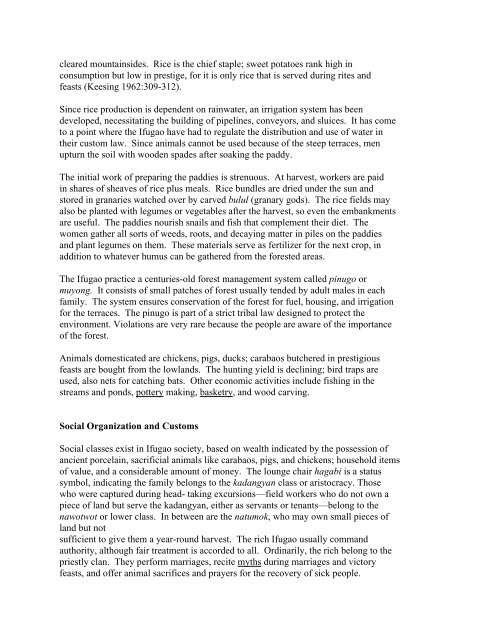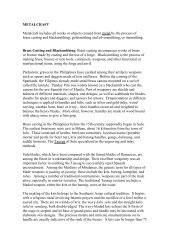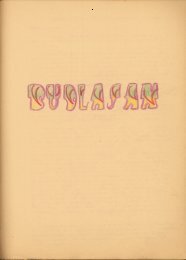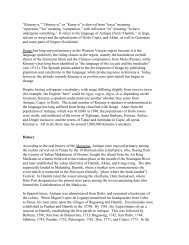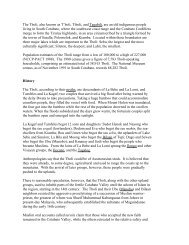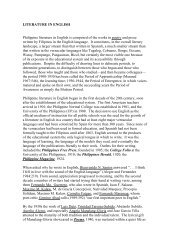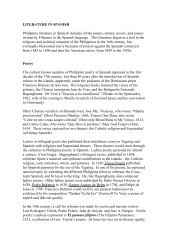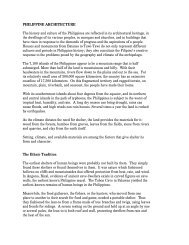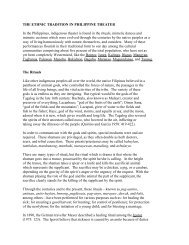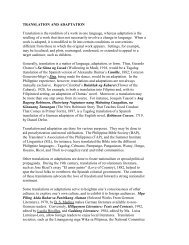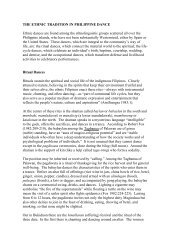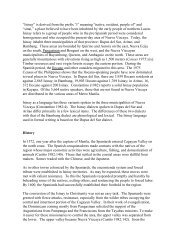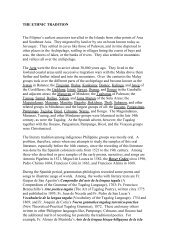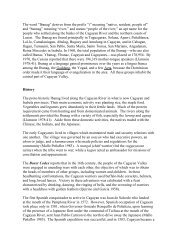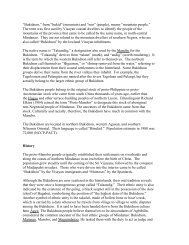“Ifugao” refers to the group of people living in Ifugao province ...
“Ifugao” refers to the group of people living in Ifugao province ...
“Ifugao” refers to the group of people living in Ifugao province ...
You also want an ePaper? Increase the reach of your titles
YUMPU automatically turns print PDFs into web optimized ePapers that Google loves.
cleared mounta<strong>in</strong>sides. Rice is <strong>the</strong> chief staple; sweet pota<strong>to</strong>es rank high <strong>in</strong><br />
consumption but low <strong>in</strong> prestige, for it is only rice that is served dur<strong>in</strong>g rites and<br />
feasts (Kees<strong>in</strong>g 1962:309-312).<br />
S<strong>in</strong>ce rice production is dependent on ra<strong>in</strong>water, an irrigation system has been<br />
developed, necessitat<strong>in</strong>g <strong>the</strong> build<strong>in</strong>g <strong>of</strong> pipel<strong>in</strong>es, conveyors, and sluices. It has come<br />
<strong>to</strong> a po<strong>in</strong>t where <strong>the</strong> <strong>Ifugao</strong> have had <strong>to</strong> regulate <strong>the</strong> distribution and use <strong>of</strong> water <strong>in</strong><br />
<strong>the</strong>ir cus<strong>to</strong>m law. S<strong>in</strong>ce animals cannot be used because <strong>of</strong> <strong>the</strong> steep terraces, men<br />
upturn <strong>the</strong> soil with wooden spades after soak<strong>in</strong>g <strong>the</strong> paddy.<br />
The <strong>in</strong>itial work <strong>of</strong> prepar<strong>in</strong>g <strong>the</strong> paddies is strenuous. At harvest, workers are paid<br />
<strong>in</strong> shares <strong>of</strong> sheaves <strong>of</strong> rice plus meals. Rice bundles are dried under <strong>the</strong> sun and<br />
s<strong>to</strong>red <strong>in</strong> granaries watched over by carved bulul (granary gods). The rice fields may<br />
also be planted with legumes or vegetables after <strong>the</strong> harvest, so even <strong>the</strong> embankments<br />
are useful. The paddies nourish snails and fish that complement <strong>the</strong>ir diet. The<br />
women ga<strong>the</strong>r all sorts <strong>of</strong> weeds, roots, and decay<strong>in</strong>g matter <strong>in</strong> piles on <strong>the</strong> paddies<br />
and plant legumes on <strong>the</strong>m. These materials serve as fertilizer for <strong>the</strong> next crop, <strong>in</strong><br />
addition <strong>to</strong> whatever humus can be ga<strong>the</strong>red from <strong>the</strong> forested areas.<br />
The <strong>Ifugao</strong> practice a centuries-old forest management system called p<strong>in</strong>ugo or<br />
muyong. It consists <strong>of</strong> small patches <strong>of</strong> forest usually tended by adult males <strong>in</strong> each<br />
family. The system ensures conservation <strong>of</strong> <strong>the</strong> forest for fuel, hous<strong>in</strong>g, and irrigation<br />
for <strong>the</strong> terraces. The p<strong>in</strong>ugo is part <strong>of</strong> a strict tribal law designed <strong>to</strong> protect <strong>the</strong><br />
environment. Violations are very rare because <strong>the</strong> <strong>people</strong> are aware <strong>of</strong> <strong>the</strong> importance<br />
<strong>of</strong> <strong>the</strong> forest.<br />
Animals domesticated are chickens, pigs, ducks; carabaos butchered <strong>in</strong> prestigious<br />
feasts are bought from <strong>the</strong> lowlands. The hunt<strong>in</strong>g yield is decl<strong>in</strong><strong>in</strong>g; bird traps are<br />
used, also nets for catch<strong>in</strong>g bats. O<strong>the</strong>r economic activities <strong>in</strong>clude fish<strong>in</strong>g <strong>in</strong> <strong>the</strong><br />
streams and ponds, pottery mak<strong>in</strong>g, basketry, and wood carv<strong>in</strong>g.<br />
Social Organization and Cus<strong>to</strong>ms<br />
Social classes exist <strong>in</strong> <strong>Ifugao</strong> society, based on wealth <strong>in</strong>dicated by <strong>the</strong> possession <strong>of</strong><br />
ancient porcela<strong>in</strong>, sacrificial animals like carabaos, pigs, and chickens; household items<br />
<strong>of</strong> value, and a considerable amount <strong>of</strong> money. The lounge chair hagabi is a status<br />
symbol, <strong>in</strong>dicat<strong>in</strong>g <strong>the</strong> family belongs <strong>to</strong> <strong>the</strong> kadangyan class or aris<strong>to</strong>cracy. Those<br />
who were captured dur<strong>in</strong>g head- tak<strong>in</strong>g excursions—field workers who do not own a<br />
piece <strong>of</strong> land but serve <strong>the</strong> kadangyan, ei<strong>the</strong>r as servants or tenants—belong <strong>to</strong> <strong>the</strong><br />
nawotwot or lower class. In between are <strong>the</strong> natumok, who may own small pieces <strong>of</strong><br />
land but not<br />
sufficient <strong>to</strong> give <strong>the</strong>m a year-round harvest. The rich <strong>Ifugao</strong> usually command<br />
authority, although fair treatment is accorded <strong>to</strong> all. Ord<strong>in</strong>arily, <strong>the</strong> rich belong <strong>to</strong> <strong>the</strong><br />
priestly clan. They perform marriages, recite myths dur<strong>in</strong>g marriages and vic<strong>to</strong>ry<br />
feasts, and <strong>of</strong>fer animal sacrifices and prayers for <strong>the</strong> recovery <strong>of</strong> sick <strong>people</strong>.


